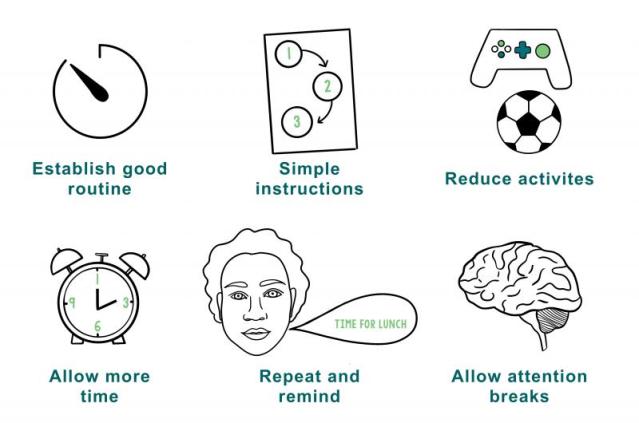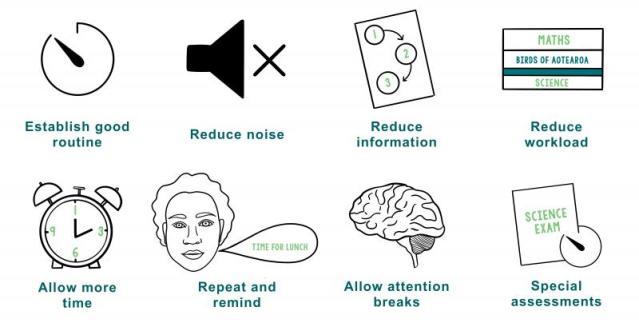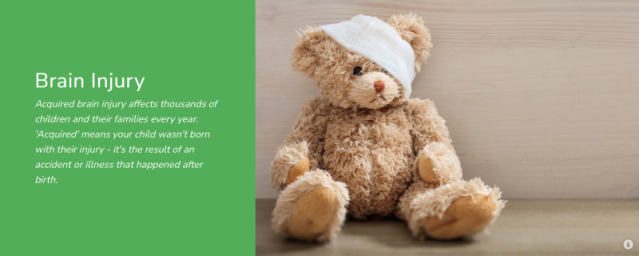Key points about difficulties with concentration and taking in information
- children who have had a brain injury (or a medical condition that affects the brain) may have difficulty concentrating, staying focused for longer periods and taking in information
- there are several ways you can help
- establish good routines
- keep instructions simple
- allow time for 'attention breaks' to give your child's brain enough energy to make it through the day
This page is part of a whole section on brain injury. You might also find some of the other content helpful.
What might I notice if my child has difficulties with concentration and taking in information?
- difficulty focusing attention or staying focused for longer periods
- being easily distracted by things like other children, noise or nearby activities
- difficulty following instructions and taking in new information
- forgetfulness
- taking longer to think of ideas or respond to questions
- failure to complete activities or tasks or giving up easily, especially on tasks that require more concentration
- difficulty coping with more than one task or activity at a time
- becoming easily overwhelmed by large amounts of information, stimulation or too many activities
- getting tired more quickly than their peers, as responding to things takes more mental energy
- slowing in response time or worsening of concentration and behaviour as the day goes on
What can I do to help my child who has difficulties with concentration and taking in information?
Establish good routines
Establish regular routines for everyday activities and help your child with structuring their day and week. Having less to think about frees up their attention to focus on learning new things.
Schedule activities requiring lots of attention or mental processing earlier in the day (such as schoolwork tasks) and keep the afternoons more relaxed or less demanding. Follow a consistent bedtime routine that gives your child enough time to unwind.
Keep instructions simple
Try to keep instructions brief or limit them to 1 or 2 at a time. For example, if you have asked your child to brush their teeth in the morning, wait until they have finished before prompting them to go and get their school bag.
Reduce activities
Reduce your child's daily activities, particularly on school days. Remember, hanging out with friends and family (particularly in big groups), taking part in extracurricular activities such as team sports or going to after-school care also needs concentration, which uses brain energy.
However, spending all their time at home doing nothing also does not help – it is important to make sure your child is still doing some things they enjoy (just a bit less than before).
Give your child more time
Slow down when giving your child instructions and make sure they have understood. Give them enough time to process information, instructions or questions and to respond. Allow plenty of time to complete everyday routines or new tasks (such as getting ready for school or homework tasks).
Provide repetition and reminders if needed
Repeat instructions if your child appears to have missed (or ignored) what you have said. Give them a list of things they need to do, so they can tick tasks off when they have completed them (such as steps for getting ready for school in the morning). Give your child plenty of opportunities for practice when they are learning new things.
Allow time for attention breaks
Break up tasks that take longer or require more concentration (like homework) with 'attention breaks'. Attention breaks can involve doing a relaxing activity that does not need too much concentration or a simple physical activity like a walk.
Make sure your child doesn't use electronic devices (like computers, iPads or mobile phones) during attention breaks, as they tend to activate the brain and won't help your child's brain to rest.
Plan ahead
Plan for busy periods (such as busy social activities/school exams etc) in advance to allow a quiet period before and after (with plenty of time for attention breaks).
What can school do to help my child who has difficulties with concentration and taking in information?
You can talk with your child's teacher about your child's difficulties and show them this website with things they can do to help.
Provide an environment and routine that helps
Teachers can help by having a familiar classroom routine. New activities or frequent changes need more attention and mental processing. Teachers can sometimes plan the timetable so that activities needing higher levels of concentration happen earlier in the day, when your child has more brain energy.
Reduce noise and distractions
Teachers can sometimes reduce noise and distractions in the classroom. They could place your child in the front of the class or with quieter, less distracting children. This will help your child's brain energy last longer. Teachers should make sure they have your child's attention (using eye contact) before giving any instructions.
Reduce the amount of information they need to focus on and take in
Teachers should try to limit instructions or information given verbally to 1 or 2 new ideas at a time. They could also reduce the amount of information given on worksheets. Teachers can also help by providing photocopied notes or allowing your child to take a picture of written material when possible (instead of asking them to copy information down in writing).
Your child may find using a laptop or keyboard easier for written tasks.
Reduce workload
Teachers can reduce the amount of work your child has to complete.
If your child is at primary school, this can mean focusing the curriculum on more essential areas and removing or reducing homework.
If your child is at high school, teachers can help by removing a subject or subjects from their timetable. They can then use free periods for attention breaks, rest, revision or to complete homework. They may also need reduced homework loads and/or extra time to complete assignments, particularly if several things are due at the same time.
Allow more time
Teachers can help by slowing down when giving instructions or information and checking your child's understanding. Give them enough time to process information, instructions or questions and to respond. Teachers should ensure your child has enough time to complete schoolwork tasks at their own pace and limit the use of timed tests.
Provide repetition and reminders
Teachers can repeat information or instructions if your child appears to have missed what has been said. They can provide opportunities for extra revision and practice to help your child take in and learn new things. Instructions could be put in writing or as picture cues (which can also go on the board in the classroom). Teachers can provide prompts and encouragement to help your child stay on task or complete tasks if they are easily distracted.
Allow time for attention breaks
Break up tasks that require more attention/mental processing with 'attention breaks'. An attention break can involve doing a relaxing activity that does not need too much concentration or a simple physical activity (such as taking something to the office for the teacher).
Don't use electronic devices (like computers, iPads or mobile phones) during attention breaks, as they don't give the brain a break from concentrating.
Special assessment conditions
Children with significant attention difficulties or reduced processing speed often qualify for special assessment conditions (including separate accommodation, extra time to allow for attention breaks and writer support).
Check the external links below for resources for practical resources for teachers to support students following brain injury.
See more KidsHealth content on brain injury
Acknowledgements
The content on this page has been developed and approved by the Paediatric Rehabilitation Team and the Clinical Neuropsychology Team, Consult Liaison, Starship Child Health.



